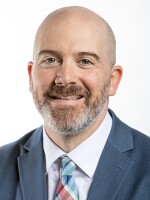DAVID GREENE, HOST:
Let's meet the new governor of North Carolina. Democrat Roy Cooper won a close contentious election, and his state is seen as a hotbed of partisan politics heading into 2017. Jeff Tiberii of member station WUNC reports.
JEFF TIBERII, BYLINE: Roy Cooper's political career took off 28 years ago this month. He was part of a coup to overthrow the speaker of the North Carolina House, a fellow Democrat. Joe Mavretic assembled 20 Democrats who worked with Republicans to take over the chamber.
JOE MAVRETIC: We were well organized, and we handled the clandestine part of it very well, the counter-intelligence part of it extraordinarily well.
TIBERII: It was a huge risk for the young lawmaker. Cooper was just 31 years old and in his second term. Within two years, Cooper was appointed to the state Senate. Then he moved on to North Carolina's attorney general for four terms. In November, he narrowly defeated Republican incumbent Pat McCrory for the executive mansion.
MAVRETIC: This is a governor who when he sees something that needs to be done, he's willing to roll the dice.
TIBERII: These are tumultuous times in North Carolina. Cooper will have to take some big chances in the current political climate. Republicans hold veto-proof majorities in both chambers of the legislature, and they plan to make Cooper's life difficult.
(SOUNDBITE OF ARCHIVED RECORDING)
UNIDENTIFIED MAN: The House will come back to order.
TIBERII: Days after he was declared the winner, lawmakers held an unscheduled special session and stripped the incoming governor of some key powers. For his part, Cooper has announced plans this week to expand the federal Medicaid program, even though state law forbids him from doing so.
(SOUNDBITE OF ARCHIVED RECORDING)
ROY COOPER: It is common sense for North Carolina to keep its option open as we go into this new health care arena under a Trump presidency.
TIBERII: Cooper is also likely to face tough fights over the budget and redistricting. And then there's House Bill 2, the bathroom bill passed last year limits protections for the LGBT community and led to economic boycotts of North Carolina. While serving as attorney general, Cooper refused to defend the measure in court. Now as governor, he wants to work with Republicans to repeal it.
(SOUNDBITE OF ARCHIVED RECORDING)
COOPER: I think, you know, campaign talk is tough, but now that we're past this election, let's roll up our sleeves.
TIBERII: A bipartisan effort to repeal the controversial law failed last month. And there's little trust between Cooper and his chief political adversary, Republican Phil Berger, who leads the state Senate.
(SOUNDBITE OF ARCHIVED RECORDING)
PHILIP BERGER: I think there's a lot to be said about leadership in state government, particularly the incoming leadership in the executive branch. I think Roy Cooper did everything he could to sabotage a reasonable compromise.
TIBERII: Cooper and lawmakers are gearing up for a contentious session this year. Political scientist David McLennan says Cooper will likely have to make his case to voters if he wants to accomplish anything.
DAVID MCLENNAN: He is the governor and can command sort of the bully pulpit of North Carolina and perhaps move some public opinion.
TIBERII: McLennan says Cooper is going to spend the year fighting the legislature and may have to turn to the courts often to get his way. It will take all of Cooper's political skill to govern in this polarized state. For NPR News, I'm Jeff Tiberii in Raleigh, N.C. Transcript provided by NPR, Copyright NPR.





